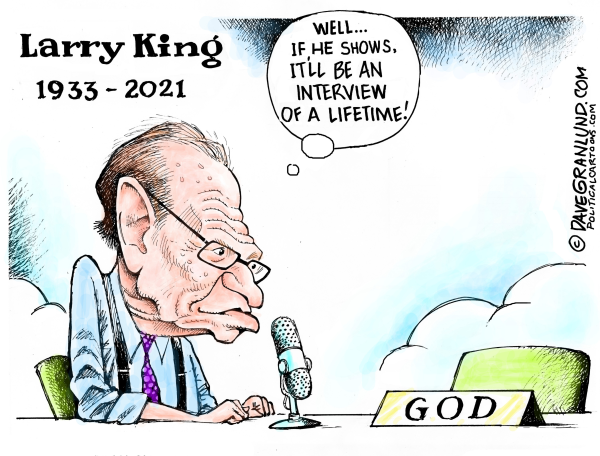
Larry King has died. He was 87. He enjoyed his celebrity, had an interesting personal life, married a lot of women, and hawked his share of products, sure. He was mocked and mimicked by many comics.
But Larry King knew how to do one thing really well. Interview. For 25 years, he hosted "Larry King Live" on CNN, an hour-long program that usually featured one or two prominent guests in conversation. King always had his sleeves rolled up and his suspenders snapped. He would bellow, "Tonight!..." in that gravelly voice and off he would go.
His show was the beginning of people watching cable news at night. It started in 1985 and quickly became part of the American vocabulary. "Who's on Larry King tonight?" The answer was everyone.
Every U.S. president during those years sat across from him at least once. The biggest names in movies, music, sports and business did, too. Margaret Thatcher. The Dalai Lama. Prince. Marlon Brando. For years, it was CNN's top-rated program. Quite literally, it changed the TV landscape.
When I read that King had died, I quickly perused the media obituaries to see how they characterized him. Not surprisingly, he was labeled as "breezy" (New York Times) and a "TV host who gave bold-faced names a cozy forum" (Washington Post). The Los Angeles Times repeated an old insult from Howard Rosenburg, their media critic, "King couldn't find his way to the jugular even with a compass, track dogs and body map."
Of course, that assumes the point of an interview is to find the jugular.
A conversation, not an attack
King didn't believe that, and neither do I. Interviewing, I have found — after more than 35 years doing it — is subtler than you think. And less is often more. Young journalists, looking to make a name, sometimes take a combative approach. More established names believe out-yelling their guest is the way to go.
Lately, the type of interview you see depends on which political party the outlet supports, easy questions for those they embrace, angry ones for those they don't.
King never approached interviews that way. To him, the subject was someone to get to know, as if they'd been seated together for lunch. He was criticized for not reading the books of his guests, but he argued he didn't want to know more than his audience. He sometimes drifted into seemingly trivial questions — like the time he asked Richard Nixon "Is it hard to drive by the Watergate (hotel)?" or Jascha Heifetz: "Jascha, why the violin?"
But critics overlook the answers to those simple questions. Nixon revealed that he'd actually never been in the Watergate hotel, and when King said "Never been in?" Nixon responded "No ... other people were in there, though, unfortunately."
When Heifetz was asked "Why the violin?" he replied: "My mother made me."
Both are terrific nuggets of answers. King got them because his guests were relaxed. They were in a conversation, not a confrontation. When reporters set up an adversarial atmosphere, they usually get clipped or cliched answers, then complain that the subject "didn't say anything."
They'd be better off heeding the advice I heard early in my career. There are few more seductive words than "I want to hear your story."
A simple question
I once had a conversation with King about interviewing. He told me what he'd told others, that he didn't think it was the interviewer's job to ask a 3-minute query just to show off how much knowledge he had.
"Sometimes the most effective question," he said, "is ‘Why?' "
That's so simple, it's nearly profound. Why the violin, Sascha? Why did you choose acting, Marlon Brando? Why did you pick "the Artist Formerly Known As" Prince? It certainly elicits freer responses than questions that begin with "Are you surprised that…" or "How do you defend your…" or "Critics have called you…"
But that's where we've shifted. King was ultimately viewed as "soft" and his show was dropped in 2010, largely because he was losing ratings to edgier political fare on Fox News and MSNBC. The man who replaced King, Piers Morgan, was hired, in part, for his combative nature.
Morgan once tweeted to King, "I made my CNN show all about gun control and saving lives. You made yours about blowing smoke up celebrity backsides."
Morgan lasted three years. By the time he was canceled, his show was a tenth the size of the audience with which he'd started.
There's a lesson there. Sometimes people want to hear other people speak. The audience is smart enough to draw its own conclusions, they can tell if someone is being forthright or evading. But if the interviewer insists on declaring all that for them, the subject is likely to curl into defense mode, and the audience turns away.
King often credited his success to the simple fact that that he was "intensely curious about people." That is a prerequisite for the interviewer's job. It's also the perch from which a good interview should be conducted.
King's voice was distinct. But at the end of the show it wasn't the one you remembered most. There's a lesson there the rest of us could use. For that, King deserves a final thanks.
(COMMENT, BELOW)


 Contact The Editor
Contact The Editor
 Articles By This Author
Articles By This Author